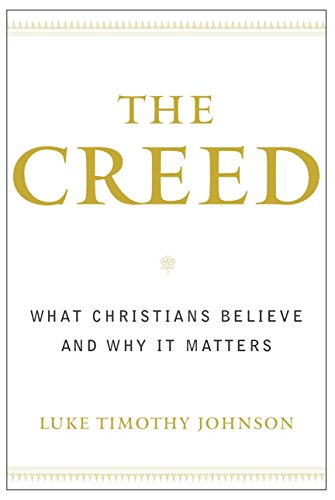Next Tuesday we will begin our discussion of Luke Timothy Johnson’s The Creed: What Christians Believe and Why It Matters. Please read the Introduction and Chapter 1: “Origins and Development” where will be discussing the history of the Creed.
Most of the Nicene Creed was formalized at the First Ecumenical Council at Nicaea in 325 and expanded and confirmed at the Second Ecumenical Council at Constantinople in 381. Except for one addition by the Western Church, the Creed has remained unchanged since the Council of Constantinople. Although the Creed was only formulated in 325, the Church has employed various creedal statements since our beginning. Many of these statements are found in the Scriptures. See, Deut. 6:4, John 1:1-5, 14, Rom. 10:9, 1 Cor. 15:3-7, Phil. 2:6-11, Col. 1:15-20. Over the next few centuries, the Church expanded and formalized these early statements in order to preserve the essential beliefs of the Church. I have attached some of these early creeds for your review.1 In reading these early statements, hopefully, you will notice that the Nicene Council did not invent the Creed, but simply brought together existing statements of faith. If you are interested in a more detailed study of the pre-Nicene creeds of the Church, a great book is J.N. D. Kelly’s Early Christian Creeds.
I’m looking forward to our new study. Dinner is at 6. The menu is turkey burgers. Discussion about 6:45. Please bring a friend. If you still need a book, please let me know.
The grace of the Lord Jesus Christ and the love of God and the fellowship of the Holy Spirit be with you all.
2 Corinthians 13:14
- St. Ignatius, Letter to the Smynaeans, Ch.1 (c.100)
Justin, First Apology, Ch.13 (c.150)
Justin, Dialogue with Trypho, Ch.85 (c.150)
St. Irenaeus, Proof of the Apostolic Preaching. para.75 (c.190)
Tertullian, Against Praxis, Ch.2 (c.200)
St. Hippolytus, The Apostolic Tradition, Ch.21 (c.215) ↩︎

